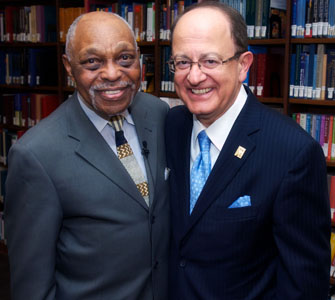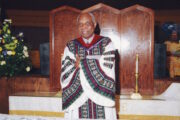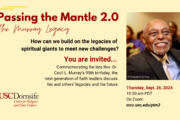This post originally appeared on USC News.
USC President C. L. Max Nikias hosted an event on Oct. 2 at Doheny Memorial Library celebrating the legacy of the Rev. Cecil “Chip” Murray and the publication of his memoir, Twice Tested by Fire.
Varun Soni, dean of Religious Life at USC, began the evening by noting that the gathering “brought together two great peacemakers,” Nikias and Murray, on the fortuitous date of Mahatma Gandhi’s birthday.
Murray, who graduated from the Claremont School of Theology, held many posts at various churches, helping to expand the congregations as well as championing many community-minded focus groups.
During his 27 years as a pastor at First African Methodist Episcopal Church (FAME), Murray transformed what began as a small congregation into a church with more than 18,000 people and economic development programs that created housing and job opportunities in South Los Angeles neighborhoods. After retiring from this post, Murray joined the faculty of USC, where he holds the John R. Tansey Chair in Christian Ethics at the USC School of Religion and serves as senior fellow of the USC Center for Religion and Civic Culture.
“For us at USC, he is a spiritual leader, a role model, a moral touchstone and friend,” Nikias said in his introductory remarks of Murray. “For many throughout Los Angeles, he is a senior statesman in the African-American community and a trusted compass for very complex ethical questions.”
Nikias also congratulated Murray on the launch of the newly created USC Cecil Murray Center for Community Engagement, which trains members of the faith community to promote economic development and civic engagement in low-income neighborhoods.
Later that evening, Murray sat down for a conversation with the Rev. Mark Whitlock, executive director of the Murray Center.
Murray recounted a harrowing tale of survival — his first trial by fire — in the early 1950s. Then a young U.S. Air Force navigator, Murray was in a warplane when it erupted in flames on the tarmac. The pilot escaped the cockpit, but Murray remained trapped.
As the flames spread, he heard a voice that directed him to stay calm, remove his helmet and parachute, and exit through a small opening behind him. That same voice directed him to be a voice for peace during the Los Angeles riots of 1992 and begin the process of healing a broken city.
Murray also spoke of the need to become “life preservers” for others, addressing what Martin Luther King Jr. described as the triple evils of poverty, racism and war. Young people, Murray said, must “avoid the snare of cynicism” and recognize that we are all family.
“The smallest bundle in the world is a person all wrapped up in himself,” he said.
Following a Q-and-A session, opera singer Brenda Jackson performed “The Impossible Dream” and a representative for Los Angeles Mayor Antonio Villaraigosa presented Murray with a proclamation in honor of his community service and recent 83rd birthday.
Distinguished guests at the event included first lady Niki C. Nikias, USC Senior Vice President of University Relations Thomas S. Sayles, Los Angeles County Supervisor Mark Ridley-Thomas PhD ’89, Bishop Kenneth Ulmer and former FAME parishioners.
The Office of the President, the Office of Religious Life, the USC Center for Religion and Civic Culture, and USC Spectrum presented the event.





